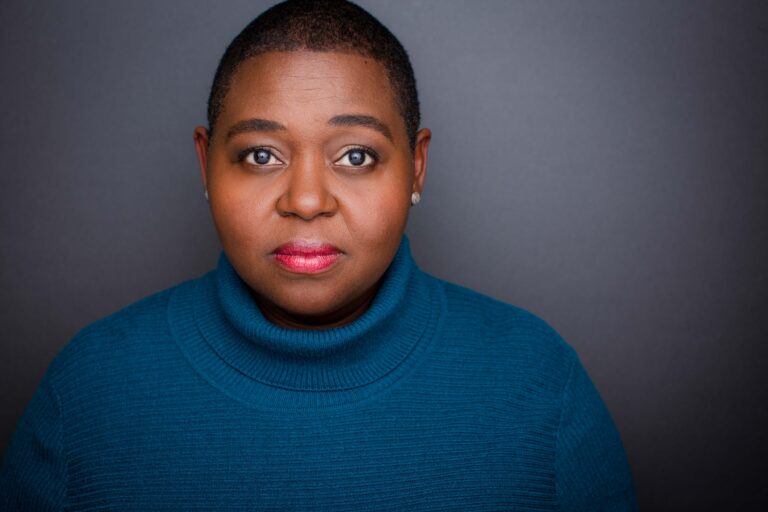

Interview with Mya Brown – The Mountaintop’s Director
Written by Micah C. Beachy
Mya Brown is an Assistant Professor and Co-Coordinator of the BFA in Acting at UNC-Greensboro, and Assistant Faculty with Theatrical Intimacy Education, one of the nation’s leading organizations in theatrical intimacy practices. She’s excited to return to WVPT in the role of director. You may remember her acting credits: Romeo & Juliet, A Funny Thing Happened on the Way to the Forum, and Elvis: The Musical (staged reading). Sample Directing credits: Pride and Prejudice (SUNY Oswego), Skeleton Crew, SWEAT, A Midsummer Night’s Dream (UNCG). Follow her on Instagram and TikTok @myasturnnow.
Interviewer: What drew you to Katori Hall’s play The Mountaintop? Can you share your initial impressions and why you felt compelled to direct it?
Mya: Katori Hall has written a thought-provoking and fantastical look at the night before Martin Luther King Jr. was assassinated. The play made its Broadway debut in 2011 with Samuel Jackson portraying Dr. King and Angela Bassett co-starring in the role of Camae. From the first time I read this play, I knew I wanted to craft a version of it. It is my kind of theatre: daring, aggressive, poignant, cathartic, and timely.
Interviewer: As you navigate the rehearsal process for The Mountaintop, what are some of the key themes and messages that you hope to bring to the forefront?
Mya: The history books have painted Dr. King as a simple pacifist and created a sort of distance from him because of his exaltation to sainthood. In my director’s concept, I discuss my desire to bridge the gap between King the civil servant and King the social radical. Hall provided all of the ingredients necessary to remind our audience that Dr. King was just a man, and if he could inspire a nation to change for the greater good so can each of us! One of the dangers we face when elevating our leaders to saintly status is that they are an exception and NOT the rule. This is dangerous because it leaves no room for everyday folks like you and me to dare at achieving the type of greatness he did. But it takes everyday folks to move the needle. It takes everyday folks to stand up, speak out, and take action against the injustices they witness day to day. Our production will remind its audience that Dr. King was no better than you or me. He was a flawed man with both strengths and vices.
Interviewer: How are you approaching the task of bringing Martin Luther King Jr.’s last night to life on stage? What specific aspects of his character and the historical context are you focusing on?
Mya: We are focusing on Dr. King, the man, the husband, the father, and the friend. We recognize that audience members will enter the space with preconceived notions around how he will be represented. I believe they will be pleasantly surprised by Katori Hall’s interpretation of our beloved civil rights leader.
Interviewer: Can you talk about the challenges and opportunities of directing a play that intertwines historical events with imaginative elements? How do you strike a balance between authenticity and creative interpretation?
Mya: Nearly all of my favorite plays blend fantasy and realism. I am drawn to the supernatural, it provides an opportunity to “wow” the audience with theatre magic. Balancing realism and anti-realism simply boils down to maintaining the truth of the story. Audiences have agreed to willingly suspend their disbelief and so they accept the world of the play as truth. If we focus our efforts on exposing the heart of the play, it will resonate with audiences.
Interviewer: The Mountaintop tackles important social issues and invites audiences to engage in conversations about civil rights. How are you preparing the cast to handle these sensitive topics, and what impact do you hope the play will have on the audience?
Mya: This production allowed me to engage in a sort of affinity space when working with the actors. It was so refreshing to share space and artistry with other Black creatives. We were able to have transparent conversations about the themes of the play (racism, social justice, politics, and religion) without feeling obligated to filter our thoughts for the purpose of easy consumption through the white gaze. We collectively are inspired to share this story with the community in hopes of calling them to action. “The baton passes on” to every human that enters the space to join the fight against social injustices. As Dr. King so eloquently states in his “Letter from a Birmingham Jail”, “Injustice anywhere is a threat to justice everywhere.”
Interviewer: Finally, as a director, what do you hope audiences will take away from The Mountaintop? What emotions or thoughts do you want them to experience as they leave the theater?
Mya: I want audience members to walk away from this production understanding that they have the makings to affect change in their communities. They can fight for what they believe in with the same ferocity that MLK did. They can help create a better future for our nation and the world. Dr. King believed that we have a responsibility to radically love our fellow humans; let’s honor his belief.



